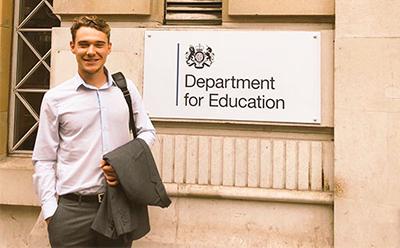
Back in September, I had decided that I would actively start looking for various work experience opportunities. I had recently completed my first-year progression review and my first paper was in the process of being finalized, so I thought if anytime would be a good one, it would be now. I had regularly been receiving emails from Public Policy|Southampton about various internship opportunities, and in September I got an email advertising a placement opportunity at the Department for Education (DfE). The department was looking for a quantitative Ph.D. to work on a specific project for three months. This seemed like as good an opportunity as any, so I decided to send my CV to Public Policy|Southampton and in what felt like no time I was on the train up to London for my first day.
I was based in the Central Analysis Unit, a cross-cutting division working on a variety of projects from across the department it comprises of about 40 analysts from the different government analytical professions. I was struck by the collaborative attitude, not only within the unit but across the department. The unit's approach to all their projects was to utilize the variety of expertise they had within the unit as effectively as possible, and it wasn't long before I was involved in this too. This was in stark contrast to my experiences of doing a Ph.D., where I spend most of the time in isolation working on my thesis. It was a refreshing change to work in a collaborative way, although it did require some adjustment on my part. The first few weeks I had spent almost my whole time on the project I had been given but over the course of the placement, I was pulled into working increasingly alongside the other analysts in various ways.
About halfway through the placement, I was asked to do some quality assurance for an analysis project which was being done as part of a review of school exclusions. I was asked because of my analytical understanding and extensive training in the statistical work they were doing. By then the unit’s approach had rubbed off on me and I had no reservations about being frank with what I thought of the work. Subsequently, I was asked to help the team in bettering the analysis they had done. The remainder of my placement was spent doing this work and eventually concluded in a presentation to senior civil servants including the Permanent Secretary and will be published in the near future.
The entire placement was an eye-opener into the work the civil service do and has given me a very different perspective on research and the work we do in academia. The time constraints that civil service analysts work under was not something I was used to. Analysts in the Civil Service are required to do research which is good enough in sometimes very short periods of time. Again, this took some adjustment on my part, because the approach is quite at odds with my experiences of academic research. These placements have significant benefits for both parties. As Ph.Ds.’, we not only get valuable work experience but also better understand how the work we do can have an impact on policy. The department benefited by getting expertise work on a given project for a short time and through collaboration analysts in the civil service can keep up to date with recent analytical developments in academia. My work with the DfE extended beyond the work experience placement and I worked will work in a part-time capacity for them post-placement. I hope that the partnership we have developed will continue and give me the opportunity to be part of impactful work and for the department to lean on the expertise I can offer.
I thoroughly enjoyed my time at DfE and in particular working with the Central Analysis Unit and I would recommend the experience to any Ph.D. student looking for work experience or even time away from their Ph.D. for a short period. The experience has given me a much-needed refresh and I'm now excited and determined to resume my Ph.D. studies.
Rhys Llewellyn Thomas is PhD Student in Economics at the University of Southampton.